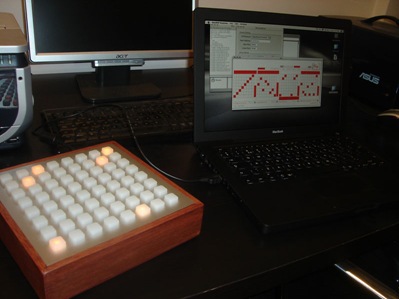Donald Bell, aka electronic musician Chachi Jones, nabs what I believe is the first hands-on time with the LED-and-button-laden Tenori-On digital instrument on American shores. Yamaha’s Yu Nishibori stopped by the music tech boutique Robotspeak in San Francisco for a chat; I got to play Robotspeak in January and it’s a brilliant place. Donald recorded the conversation for CNET.
Hands-on with Tenori-On [Crave]
Not convinced? Here’s a very different Tenori-On demo on Music thing.
Tenori-On Stands Alone, and Praising Limitations
Donald shared some of his personal (non-official CNET) take on the Tenori-On. It sounds like seeing it in person changed his mind a bit and made him want it a lot more:
I have to say the two features that surprised me the most when handling the Tenori-On (that I should have known just from reading about it) were the built-in speakers (not spectacular, but glad to see them included), and the fact that you can record directly to the internal SD memory card. Both features speak to how the Tenori-On, unlike the Monome, is a truly standalone instrument that could be used entirely without a computer. Like any good piece of hardware, you could put the Tenori-On on a shelf for 100 years and still boot it up and play with it.
Comparisons of the Tenori-On and Monome were inevitable — come on, they’re two square music gadgets with a grid of buttons that light up, and each is most often used as a kind of sample step sequencer. But Chachi gets at the heart of two issues. First, the fundamental difference between the Monome and Tenori-On is that the Monome is designed to be tethered to a computer to control music and visual software, whereas the Tenori-On is a standalone instrument.
Second, there’s the question of whether instruments’ limitations actually make them (and you) more musical. That’s counter to the standard philosophy of our industry, in which "more is more." But useful limitations, as opposed to unlimited choice, could help you to make musical choices. It’s something Public Enemy producer (among other things) Hank Shocklee brought up when I heard him speak last week. I pushed Donald on this, who was a little worried he’d come across as a Monome hater just bringing this up:
I think you’re right, however. The same match of limitations and a well-designed instrument are what attract people to products like the MachineDrum or MPC200, or even LSDJ on the GameBoy. Because it isn’t open ended, you can invest your time into learning and pushing the instrument, developing more of a musicianship (possibly) instead of becoming an amateur software programmer.
On the other hand, you look at how Daedelus and Tehn are using the Monome, and it’s apparent that having some control over personalizing your instrument can make the connection between human and machine even stronger.
And that’s where it gets interesting. The Tenori-On chooses some limitations for you, whereas the Monome lets you define some of your own limitations. Which is better? I think that’s entirely personal. But maybe those two boxes of buttons are actually more different than they first appear.
PS, Hello From America?
Okay, having gone off on design issues, is Yamaha on the verge of launching Tenori-On in the US? I hope so. We’ll have to talk to them at NAMM. In a decade that started out with what seemed like a hundred different variations of identical MIDI keyboards, even if you loathe Tenori-On and Monome, I’d say life is getting more interesting.
Previously:
Free, All Tenori-On Album: A Chat with Norman Fairbanks
Tenori-On Review, Tenori-On Limitations, Tenori-On Fatigue?
… and CDM’s own hands-on, though it technically took place in the UK, not my home in New York, New York, USA:
Hands On Tenori-On: Close Encounters of the Interactive Music Kind
Yamaha TENORI-ON Launch: Photos, Videos, Interviews, Demos, Details, and a Music Box
